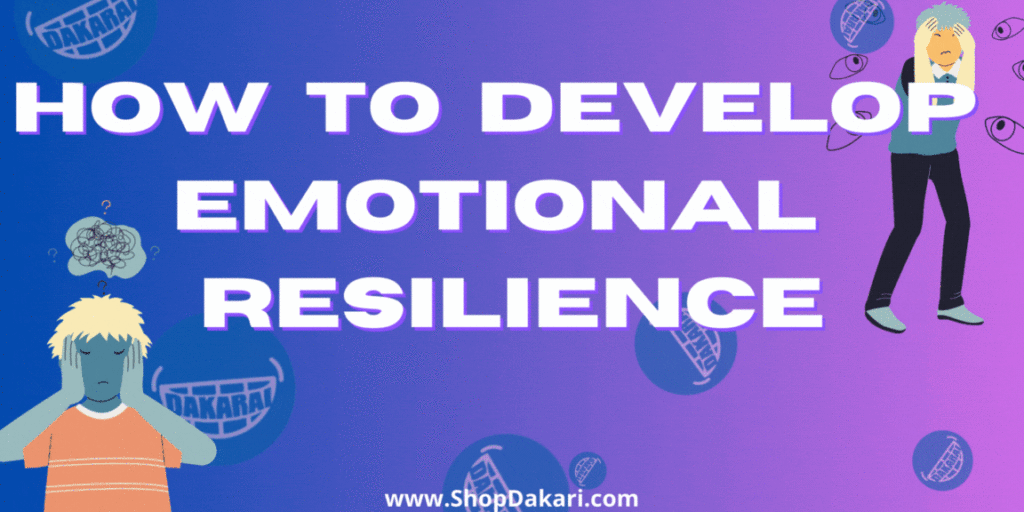
Emotional resilience involves practicing self-care, creating positive surroundings,
learning coping skills, and reframing negative thoughts.
Building emotional resilience also requires cultivating a growth mindset and focusing on strengths rather than weaknesses.
This article will significantly assist you in developing the ability to build emotional resistance and improve your overall well-being. Continue reading.
You can learn to develop your emotional resilience and embrace challenges as opportunities for growth by focusing on your strengths and boosting your confidence to overcome obstacles easily,
practicing self-care, creating positive surroundings, learning coping skills, and reframing negative thoughts.
Also, cultivating a growth mindset and focusing on personal strengths rather than weaknesses will help you develop emotional resilience.
Building emotional resilience can help you manage and reduce stress.
You can help develop emotional resilience by implementing and expanding on coping strategies that suit your needs.
These habits include practicing mindfulness, seeking support from others,
reframing negative thoughts, and more, which will be outlined in this article.
By incorporating these practices into your daily routine,
you can build a strong foundation for emotional well-being and better handle life’s challenges.
Set Boundaries
Set boundaries. Practice saying no if individuals around you feel uncomfortable or ask for too much.
It is essential to communicate your boundaries clearly and respectfully.
Remember that saying no does not make you a bad person;
it simply means you are prioritizing your own needs and well-being.
Here are some practices for learning to set boundaries that will help you improve your emotional resilience.
These practices include identifying your values and priorities, communicating your needs clearly and assertively,
and learning to say no when necessary. By implementing these practices,
you can strengthen your sense of self and improve your ability to handle difficult situations gracefully and confidently.
Examples Of Personal Boundaries And How To Build Them. I can help you establish clear boundaries for yourself.
Practice Acceptance.
Develop your acceptance. Recognize that you’ll deal with stress, pain, and changes.
Remember that those negative days will pass and that you can make the most of your day by caring for yourself.
It is important to have coping practices in place for dealing with stress,
pain, and changes, such as
- exercise,
- meditation,
- talking to a trusted friend
- acknowledging your emotions,
- reframing negative thoughts,
- practicing self-care
- Focusing on personal growth.
By taking care of yourself and prioritizing self-care,
you can better manage these challenges and improve your overall well-being.
By incorporating these practices into your life, you can develop a stronger mindset and overcome your fears.
Surround Yourself With Positive People

Surrounding yourself with positive people can help build emotional resilience,
as their optimism and support can serve as a source of strength during difficult times.
Additionally, positive social connections can provide a sense of belonging and purpose,
which is essential to promoting overall well-being. Surround yourself with more positive people.
Spending time with the positive, supportive people you love will help you let go of the negativity and express the things you find challenging to them.
A strong support system can also improve your overall well-being and mental health,
as positive people can offer encouragement and motivation during difficult times.
Additionally, being around individuals with a positive outlook on life can help you adopt a similar mindset and lead a more fulfilling life.
Maintaining good relationships is essential for resilience and a reliable support network when times are tough
because it allows you to have people you can turn to for emotional and practical support during challenging times,
which can help you cope better and bounce back quicker.
Positive relationships can also give you a sense of belonging and purpose,
which can contribute to your overall well-being and happiness.
People who care about you and are willing to lend a listening ear or a helping hand make a big difference in your ability to cope with stress and adversity.
Being around positive, like-minded people has many advantages. Check out the article “Advantages Of Being Surrounded By Positive, Like Minded People” for more information.
Develop Self-Awareness
Self-awareness helps you to identify your emotions and understand how they affect you.
By doing so, you can develop emotional resilience, allowing you to bounce back from difficult situations and maintain a positive outlook.
Self-awareness helps you identify your emotions and understand why you feel a certain way,
allowing you to develop coping mechanisms and bounce back from difficult situations with greater ease.
This emotional resilience can be further strengthened by surrounding yourself with positive and supportive people who can provide encouragement and perspective.
To improve your self-awareness, I suggest reading 8 Ways To Take Accountability For Your Actions In 2023. This will enable you to become more mindful of your actions impact on yourself and your environment.
Accept What Is
Learning to tolerate discomfort makes us more adaptable and better equipped to handle challenging situations.
This helps us develop emotional resilience, which allows us to bounce back from adversity and maintain our well-being.
You can learn to be ok with discomfort and build emotional resilience by intentionally exposing yourself
to uncomfortable situations and practicing mindfulness techniques, such as deep breathing and positive self-talk;
you can develop the ability to manage difficult emotions and bounce back from adversity.
Learn to accept what is and embrace change as Embracing change can help you develop emotional resilience,
resulting in personal growth, by assisting you to let go of the fear of the unknown and instead focus on the opportunities that change can bring.
It can also help you develop a more positive mindset and improve your ability to manage stress.
While it can be challenging to remain calm during difficult circumstances, stress limits your ability to be resilient.
Stress management will allow you to face more relaxed and focused thinking difficulties.
Regardless of how busy you are, devote some time to yourself and your emotions.
Focus On What You Can Control.
Focusing on what you can control helps develop your emotional resilience by shifting your attention away from things beyond your control,
which can reduce feelings of helplessness and anxiety.
This allows you to focus on taking action and finding solutions to your challenges,
which can increase your sense of empowerment and confidence.
You can learn to focus on what you can control by identifying the areas of your life where you have influence and setting achievable goals for yourself within those areas.
Additionally, practicing mindfulness and staying present at the moment can help
you avoid becoming overwhelmed by external factors outside of your control.
Allow yourself to be imperfect.
Accepting imperfection as a natural part of the human experience can help reduce stress and anxiety,
improving emotional resilience and well-being. It allows you to approach challenges with a growth mindset,
viewing mistakes as opportunities for learning and growth.
Instead of striving for perfection, accepting imperfection can lead to greater self-compassion by recognizing
that making mistakes is a natural part of the learning process and that you can
constantly improve yourself through effort and perseverance.
This mindset can also foster resilience and adaptability in facing obstacles and setbacks.
Allow Others To Be Imperfect.
Expecting others to be flawed develops your emotional resilience because it
allows you to have realistic expectations of others and not be too disappointed when they make mistakes or fall short.
It also helps you be more understanding and compassionate towards others,
improving your relationships and overall well-being.
An effective way to practice allowing others to be imperfect is by practicing self-compassion and understanding that everyone makes mistakes.
You can do this by treating yourself with kindness and empathy when you make mistakes and reminding yourself that
making mistakes is a natural part of the learning process.
Additionally, it can be helpful to challenge any perfectionistic tendencies by setting realistic expectations for yourself and others.
It’s also beneficial to actively listen and empathize with others rather than immediately judging or criticizing them.
Practice Self-Care

Self-care can help you develop emotional resilience by encouraging self-compassion and acceptance of imperfections,
which in turn allows you to extend the same compassion and acceptance to others,
thus reducing the impact of disappointment or frustration when others inevitably make mistakes or fall short of expectations.
Additionally, self-care practices such as
- mindfulness
- stress-reduction techniques
- exercising
- eating healthily,
- getting enough sleep,
- spending time with loved ones,
- having fun,
- unwinding,
These practices can help build emotional resilience by improving your ability to regulate emotions and cope with difficult situations.
Practice self-compassion and be gentle with yourself to maintain self-esteem and release pent-up emotions.
Take a break, eat healthily, and be open to new possibilities.
In fact, there are numerous ways to practice self-care, such as the 11 Best Ways To Support You In Establishing A Routine.
Develop A Positive Mindset.

Maintaining a positive mindset can assist you in developing your emotional resilience.
There is a bright side to every bad situation.
Remind yourself of previous accomplishments to build emotional resilience.
By focusing on the positive aspects of past experiences,
you can train your mind to find the silver lining in any difficult situation,
which can help you bounce back quicker and stronger.
It’s important to remember that setbacks are a natural part of life and can be opportunities for growth and learning.
If you want to learn more, I recommend reading 15 Ways To Improve And Develop A Great Mindset.
Express Yourself.

Expressing yourself can build emotional resilience by allowing you to process and release pent-up emotions,
reducing stress and anxiety. Additionally, it can help you gain control over your feelings and experiences,
leading to increased self-awareness and self-confidence and strengthening the
bond between you and the person you express and trust with your emotions.
Express Yourself Share your feelings with others and find ways that are most comfortable for you.
This can assist you in clearing your mind and ‘letting go of negative thoughts.
Learning to be true to yourself can improve your ability to express yourself. Here are 11 Ways To Define What It Means To Be Yourself
Pay Attention To Warnings
Pay attention to warnings and develop emotional resilience by considering
situations where you have ignored warning signs and determining what you could have done differently.
You learn to recognize warning signs by engaging in mindfulness and self-awareness exercises to acknowledge
your emotional reactions to warnings and create coping mechanisms to handle them better.
Observe your tendencies. Keep track of your discomfort,
loss of hope, decreased enjoyment of life, loss of appetite, etc.
then take action to safeguard yourself. Self-care is essential.
By facing your fears, you expose yourself to uncomfortable situations, boost your confidence,
and learn to manage your emotions effectively.
Attention to warnings can help you anticipate potential challenges and mentally and emotionally prepare to face them.
Face Your Fears
By facing your fears, you can build up your confidence and self-esteem,
improving your emotional resilience. Additionally,
facing your fears can help you develop coping mechanisms and problem-solving skills that can be applied to other challenging situations in life.
You learn to handle difficult situations and emotions when you face your fears.
This knowledge helps to build emotional resilience, allowing you to cope better with future challenges and setbacks.
You can learn to face Your Fears and build emotional resilience by exposing yourself gradually to the things that
scare you and practicing relaxation techniques such as deep breathing or meditation.
Face Your Fears is an effective coping strategy for emotional resistance because it helps you build resilience
and confidence and allows you to overcome obstacles that might be holding you back from achieving your goals.”
Remember that facing your fears is a process that takes time and effort,
but the rewards are worth it in the end. Don’t be too hard on yourself if you experience setbacks;
instead, celebrate small victories along the way.
Identify your values
Identifying your values helps build emotional resilience by providing a sense of purpose and direction in life,
which can help individuals better cope with stress and adversity.
When faced with challenges, clearly understanding one’s values can provide a source of motivation and strength to persevere.
You can identify your values by reflecting on what is most important to you in life and what motivates you.
Once you have identified your values, you can use them as a guide for making decisions and setting goals that align with your true priorities.
Furthermore, Having ambitions and dreams makes you more resilient.
Lack of goals and direction helps to lower resilience, makes you more vulnerable to manipulation and bad decisions,
and reduces your sense of control over your life, which is a quick way to depression and anxiety.
How To Identify Your Values
Practice these habits to give your life meaning and keep you focused.
- Consider your goals, whether they are small or large.
- Make a list of all the goals you have for your life.
- Regularly evaluate your advancement.
- Identify the things that give you a sense of purpose in life and the things that eliminate that feeling.
- Follow your values and beliefs in all aspects of your life.
9 Helpful Habits To Help You Find Your Self-Worth will help you to identify your values and self-worth better.
Practice Being Grateful.
Practicing gratitude can help individuals develop a more positive outlook on life,
increasing their ability to cope with difficult situations.
Individuals can cultivate emotional resilience and better manage stress and
adversity by focusing on the good things in their lives.
In fact, there are numerous other habits that can assist you in becoming grateful. 12 Ways To Practice Gratitude For You
Strengthen Your Mindset
You can strengthen your mindset and build emotional resilience by incorporating daily practices such as mindfulness,
gratitude, and positive self-talk. Additionally,
seeking support from trusted friends or a mental health professional can also aid in developing emotional resilience.
Strengthening your mindset can help you create a more positive outlook,
improving your ability to cope with challenges and setbacks.
By focusing on growth and learning, you can build emotional resilience and become better equipped to handle stress and adversity.
Here are some practices for strengthening your mindset that will
help you improve emotional resilience. These practices include
- cultivating gratitude,
- Reframing negative thoughts
- Seeking social support.
You can develop a more positive and resilient mindset
by incorporating these practices into your daily routine.
Building Self-Esteem

Building self-esteem can help you develop emotional resilience by helping you create a positive self-image,
which in turn can lead to greater confidence and the ability to cope with challenges and setbacks.
Additionally, having a strong sense of self-worth can provide a buffer against negative emotions.
I have written an article that will assist you in boosting your confidence in life. I highly suggest reading “Helpful Tips For You To Boost Your Confidence.”
Expressing Emotions Wisely
Expressing emotions wisely can help you develop emotional resilience by allowing you to acknowledge and process your feelings healthily,
leading to greater self-awareness and coping effectively with challenges.
It can also foster stronger relationships with others,
as effective communication of emotions can lead to deeper connections and understanding.
You can learn to Express emotions wisely and build emotional resilience by practicing mindfulness techniques such
as meditation and journaling, which can help you identify and regulate your emotions in a healthy way.
” Additionally, seeking support from a therapist or counselor can also be
beneficial in developing emotional intelligence and coping skills.
Learn From Your Mistakes And Successes

Learning from your mistakes and successes can help you develop emotional resilience by teaching you to adapt to new situations,
manage stress, and build confidence in your abilities. By reflecting on what worked and didn’t,
you can develop a growth mindset that allows you to bounce back from setbacks and face challenges more easily.
Here are some practices to help you learn from your mistakes and successes and build emotional resilience by
embracing a mindset of continuous improvement and recognizing that
failure is not a permanent state but rather an opportunity for growth and learning.
” Additionally, seeking feedback from others and being open to constructive
criticism can help foster a growth mindset.
To better learn from your mistakes, continue reading How To Handle Setbacks And Learn From Them.
Identify Your Coping Strategies
Identifying coping strategies can help you better understand your emotional reactions to stress and setbacks,
which can lead to increased emotional resilience.
You’ll learn to manage your emotions better and navigate difficult situations by recognizing and employing effective coping strategies.
You can learn to Identify coping strategies and build emotional resilience by using mindfulness techniques can
also improve one’s emotional well-being, including meditation
- deep breathing exercises
- seeking support from trusted friends or a mental health professional
- engaging in physical activity
- maintaining a healthy lifestyle
1-Set Goals.
Setting goals can help you focus on positive outcomes and provide a sense of purpose,
enhancing your emotional resilience. Additionally,
achieving goals can boost your self-confidence and give you a sense of accomplishment,
further strengthening your emotional resilience.
Setting goals is an effective coping strategy for emotional resistance because it provides a sense of purpose and direction,
which can help you stay motivated and committed to maintaining a healthy lifestyle.
Additionally, setting realistic goals can also help you track their progress and
celebrate their successes along the way. Setting goals can help you stay motivated and focused on maintaining a
healthy lifestyle. Setting specific goals related to
- diet
- exercise
- and self-care
You can create a roadmap for success and feel empowered to take control of their physical and emotional well-being.
Goals and working toward them are both necessary if you want to be a more resilient person.
Whether obtaining a new job or improving your health,
planning to accomplish your goals can help you stay focused and motivated during difficult times.
Additionally, celebrating small victories along the way can boost your confidence and reinforce your resilience.
If you find it difficult to keep your goals aligned and want to learn more about goal tracking, I recommend reading 9 Tips To Help You Start Tracking Your Goals.
2- Journal Your Feelings.
Journaling can help you build emotional resilience by providing a safe space to express and process your emotions,
which can help you gain perspective and develop coping strategies. Additionally,
journaling can help you identify patterns in your thoughts and behaviors,
allowing you to better understand yourself and make positive changes.
You can learn to journal and build emotional resilience by setting aside
time each day to reflect on your experiences, expressing your emotions honestly and openly,
and using prompts or exercises to explore your thoughts and feelings more
deeply. With consistent practice, journaling can become a powerful tool
for managing stress, improving mental health, and cultivating greater self-awareness.
3-Increase Your Physical Fitness.
Physical fitness can improve emotional resilience by reducing stress and anxiety levels and increasing self-esteem and confidence.
Regular exercise can also release endorphins, natural mood boosters that
can help combat depression and enhance overall well-being.
Here are a few physical exercises you can do to build emotional resilience.
These exercises include
- deep breathing.
- Progressive muscle relaxation
- mindful meditation.
4-Practice Meditation
Meditating can help reduce stress and increase relaxation and problem-solving skills,
and It can also help you calm down and feel in control of your situation.
Regular meditation practice can lead to a more positive outlook on life and increased well-being.
Simply settle into a comfortable area free of noise and interruptions,
and take a few deep breaths to center yourself.
Then, focus on the task and remove any distractions or worries.
5-Create A Daily Routine.
Creating a daily routine can help you develop emotional resilience by providing a sense of structure and stability,
which can help you feel more in control of your life.
Additionally, a routine can promote healthy habits such as exercise, meditation,
and socializing, contributing to better mental health.
You can learn to create a daily routine and build emotional resilience by starting small and gradually adding more
activities while being flexible and allowing for changes when necessary—
finding a routine that works for you and supports your overall well-being.
5-Learn To Let Go.
Learning to let go can improve your emotional resilience by allowing you to accept and adapt to change,
which is a key aspect of resilience. It also helps you to release negative emotions and thoughts,
allowing you to focus on the present moment and find new solutions to challenges.
Letting go is an effective coping strategy for emotional resistance because it will
enable you to release the tension and stress caused by negative emotions,
which in turn can improve your mental and physical health.
Additionally, letting go can help you gain perspective, move forward with a clearer mind, and build emotional resilience.
Here are some practices for learning to let go that will help you build emotional resilience.
These practices include
- mindfulness meditation
- Journaling
- talking to a trusted friend or therapist
- engaging in physical activity
By incorporating these practices into your routine, you can develop the ability
to let go of negative emotions and build a stronger sense of emotional well-being.
Build Your Perseverance
Building perseverance is an effective emotional resistance coping strategy
because it allows you to develop the mental toughness required to push
through difficult situations and overcome obstacles.
Furthermore, developing perseverance can assist you in developing a growth mindset,
increasing your motivation and belief in your ability to succeed.
Developing a strong sense of persistence can help you become more emotionally
resilient by enabling you to persevere in the face of obstacles and setbacks.
It can result in greater control, confidence, and a more inspirational outlook.
You can choose the best habits for your needs with the help of 12 Ways to Avoid Giving Up During Difficult Times.
This content was AI-generated.
